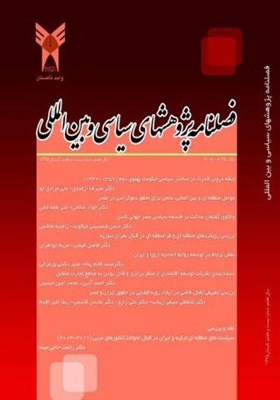حلقه درونی قدرت در ساختار سیاسی حکومت پهلوی دوم (1357-1342)
محورهای موضوعی : مجله پژوهش های سیاسی و بین المللی
کلید واژه: پهلوی دوم, ساختار قدرت, محمدرضا شاه, نخبهگرایی,
چکیده مقاله :
فهم ساختار قدرت سیاسی یکی از اساسیترین مسائلی است که یک جامعهشناس سیاسی بدان نیازمند است. بهطوریکه بدون درک دقیق ویژگیهای ساختار قدرت سیاسی و نحوه اعمال آن در هر دوره تاریخی، به تحلیل صحیح و کاملی از جوهر و رویدادهای سیاسی، اجتماعی و اقتصادی نمیتوان دستیافت. حکومت پهلوی دوم و پیامدهای آن ازجمله رویدادهای مهمی است که درک درست آن درگرو فهم علمی از ویژگیها، ماهیت ساختار سیاسی، وضعیت نخبگان سیاسی و گروههای اعمال کننده قدرت در آن است. روش این پژوهش، توصیفی- تحلیلی و بر اساس نگرش تاریخی- جامعهشناختی است. نتایج این پژوهش نشان میدهد که محمدرضا شاه ساخت قدرت را شدیداً به خود و حلقه درونی محفل دربار وابسته کرد، بهطوریکه در سالهای 57-1342 روند روابط غیررسمی محفل درونی شاه جایگزین نهادهای رسمی شد
Understanding structure of the political power is one of the major issues whom a political sociologist need; So that without an exact understanding of the political power structure and method of applying it in every historical period, a correct and complete analysis of the substance and political, social and economic events cannot be achieved. Pahlavi II and its aftermaths are major events that correct understanding of them depend on scientific understanding of the characteristics, the nature of the political structure, status of political elites as well as powerful groups. This method of research is analytical and based on historical-sociological attitude. The results showed that Shah made the structure of power dependent on himself and inner circle of court strongly; So that in the years between 1342-57 unofficial relations of inner circle of the king was established instead of formal institutions

